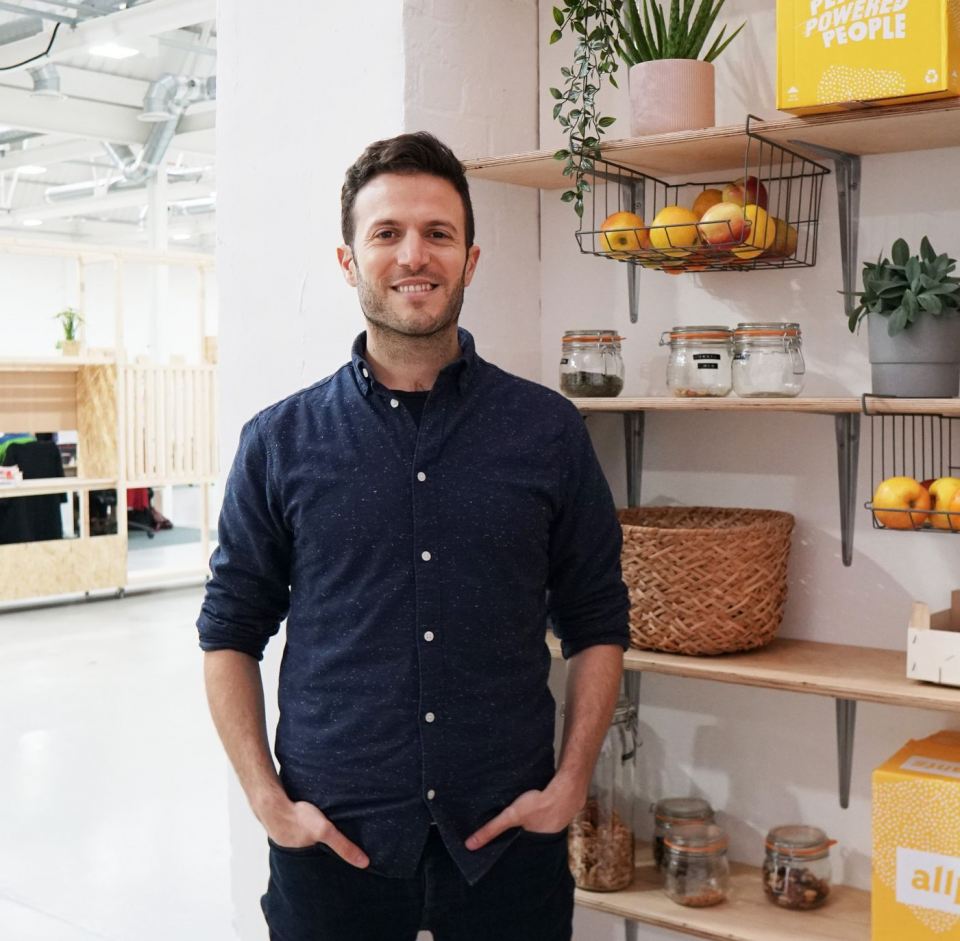Corona Impact Series: A Tottenham kitchen on a mission to make Londoners eat more plants
In this series, City A.M. looks at the financial and economic impact of the ongoing pandemic on a range of small and medium-sized businesses across London. Today: allplants, a plant-based food delivery startup that had no choice but to scale rapidly during the pandemic.

The plant-based food brand allplants was created by Jonathan Petrides and his brother Alex after they turned vegan just over five years ago.
While Alex did it for the detox, Jonathan wanted save the planet, and secretly tried to impress a girl, who is now his wife, as he shared with City A.M. this morning. After a series of fairly successful London supper clubs, they set out to inspire the planet to eat more plants.
First lockdown
Weeks before the pandemic, Petrides opened Europe’s largest plant-based kitchen in Tottenham Hale, following a £4.5m crowdfunding campaign.
“When the pandemic hit, we were already growing fast and had just opened our new kitchen, so just to keep cooking and growing our team of chefs was really challenging, with the backdrop of everything closing and transport shutting down,” he sighed.
Petrides never imagined that he’d have to pause all marketing activity, but that is exactly what happened.
“It was a real siege mentality, we had to stop all our marketing and we were cooking 16 hours a day. It was tough but our main goal was to make life that little bit easier for those at home, by continuing to cook and deliver delicious, healthy, plant-powered meals. It was full steam ahead really,” he explained.
The efforts paid off. Many existing customers went from having an allplants delivery every four to six weeks to weekly. #
Through the year, they increased staff by 65 per cent, particularly in the kitchen, providing new employment for chefs from some of London’s top restaurants that were closed.
With the new kitchen fully operational, a 20,000 sq f production facility called The Greenhouse in Tottenham Hale, all the cooking happened under one roof, which enabled allplants to focus on accelerating recipe innovation and cooking when the pandemic hit.
Jumping on the delivery bandwagon
With the change in consumer eating habits and the increased need for food delivery, Petrides’ company doubled its monthly meal deliveries last year, breaking the 2m ‘meals served’ milestone.
While initially launching with only six meals on the menu, allplants subscribers can now select from about 40 plant-based meals, as well as a range of breakfast pots, smoothies, sides, desserts and pizzas. “The meals are flash frozen to lock in nutrition,” as he put it.
Petrides thinks that with Covid-19, there has been a bit of home-cook drudgery.
“In lockdown, especially, people are exhausted at the end of the day. We are all doing way more cooking, sometimes we want a break and so having healthy meals cooked are a solution many homes are adding to their freezer.”
Initially, when Petrides launched allplants, they started by only cooking for vegans, but in their first year over 60 per cent of subscribers were people simply keen for an easy and convenient way to eat healthier food which was kinder to the planet, or what they call “plant curious”.
For Veganuary, the popular January challenge that promotes veganism, allplants made a quirky move with a bold advertising campaign.
Addressing non-vegans, it parodied the challenge of switching to a plant-based diet. Featuring a woman secretly eating cheese in her car parked in the driveway, the advert encouraged those who are trying to have a few more veg-based meals every week, with the slogan: “We’re all plants. You don’t have to be.”
The next seed
If there’s one positive take away from the pandemic, Petrides thinks it’s that people are seriously rethinking their diets.
Just before Covid-19 unfolded, he finalised the largest crowdfund for what he claimed “any vegan business on the planet”, around £4.5m.
Around 1,800 people from the local community invested, alongside venture capital firms Felix Capital and Octopus Ventures.
“The majority of allplants’ investors aren’t even vegan,” Petrides laughed.
“Veganism used to be very extreme and polarising. Now, with a growing awareness that this diet is a healthy option, the vast majority of people that are consuming more plant-based meals are not ‘the vegans’ but simply people just trying to eat a bit better.”
A further Growth Capital funding round is planned for later this year, with the company focused on building a global brand, taking their food into offline environments and serving households in Europe, North America and beyond by 2025.
“Our global appetite is already starting to turn towards plants, and we’re here to ensure allplants flips humanity onto more plants. Our secret weapon is to simply keep creating seriously fantastic food,” Petrides concluded.